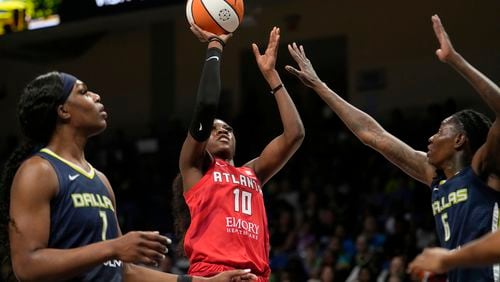Like anyone else who is paying even scant attention to the American sports landscape, Dream president and chief operating officer Morgan Shaw Parker sees and feels the wheels turning.
The NCAA women’s basketball championship game averaged 18.9 million TV viewers, for the first time surpassing the average viewership for the men’s game (14.8 million). Iowa star Caitlin Clark has become a household name and appeared on “Saturday Night Live” with nary a need to explain who she was. In its 2023 season, the WNBA posted viewership and attendance numbers that hadn’t been reached in several years.
“It’s sometimes hard not to get emotional when you think about actually what you’re experiencing now,” Shaw Parker told The Atlanta Journal-Constitution. “Because never in a million years did I think I would witness it in my lifetime.”
Shaw Parker’s job requires her to be far more than a witness, but an agent of change for a franchise trying to capitalize on that momentum. Entering its 17th season, the Dream have found stability elusive. They are under their fourth ownership regime, and coach Tanisha Wright is the team’s fifth full-time head coach. Gateway Center Arena at College Park is the team’s fourth home, including two separate stays at Philips Arena/State Farm Arena.
Not surprisingly, the Dream have struggled to make their imprint in the market. In 10 of the past 11 seasons (not counting 2020, when the season was played in a COVID-19 bubble), the club’s average home attendance has been either last or second to last in the WNBA, according to data in the women’s basketball website Across the Timeline.
“The one thing that was consistent in prior ownership was the inconsistency,” said Shaw Parker, who was hired in September 2021. “There was no home. There was no long-term investment.”
That said, Shaw Parker, who previously served as chief marketing officer for the Falcons and Mercedes-Benz Stadium and as a communications director at Nike, paints a bold picture of a franchise about to lift off in the fourth season of owner Larry Gottesdiener.
With the season starting May 15, the team sold out its season-ticket allotment (about a third of the 3,500-seat arena) and by Tuesday had sold out five games of its 20-game home schedule through a pre-sale even before single-game tickets went on sale to the general public Thursday.
The sellouts include both home games against Clark’s Indiana Fever. Shaw Parker said that “we may have announcements coming up soon” regarding the games against the Fever being moved to a larger arena to accommodate the huge demand.
“We’re going to be selling out hopefully this entire season,” Shaw Parker said.
It follows 12 home sellouts in 2023 and eight in 2022. It should be noted that a sellout at Gateway Center is not necessarily the most useful measuring stick. It is the smallest arena in the 12-team WNBA, with most arenas more than doubling its capacity. The Dream’s average home attendance last year was 3,006, according to Across the Timeline, which ranked lowest in the league. The No. 6 team averaged 7,242 and the top-drawing team 9,551. The website listed the Dream’s largest turnout as 3,209.
In a partnership with Gray Television, all games not carried on national TV will be carried locally on Peachtree TV, which Shaw Parker said will have at least 10 times the reach of the Dream’s former TV partner, Bally Sports.
The team has 50 full-time employees compared with seven previously, according to Shaw Parker. Gottesdiener has made other moves to invest in the team, including moving the practice site from Agnes Scott College to Core4 Athletic Complex, a state-of-the-art facility founded by former Hawk Paul Millsap. Gottesdiener is founder and chairman of Northland Investment Corporation, a real-estate private-equity firm with $8 billion of assets under management.
“Larry’s always been a long-term investor, so their goal was really to invest in a women’s sports organization unlike anyone else had,” Shaw Parker said.
Two significant next steps are a permanent practice facility and a new arena larger than Gateway Center. A return to State Farm Arena or Georgia Tech’s McCamish Pavilion is unlikely, as is going to the Georgia State Convocation Center or Gas South Arena in Duluth. The aim for the team is to be in a professional arena in or close to the city with a capacity between 8,000 and 12,000.
Shaw Parker mentioned renovating an existing arena or being part of a new arena as possibilities. She said that the team has been in “active discussions with folks in several parts of the greater Atlanta area and have been for well over a year and a half.”
That would be an ambitious leap for a team that has not found a foothold. But it’s one that Shaw Parker sees as part of the progress that women’s sports have made that is worth the investment. It was only earlier in April that the U.S. women’s national soccer team drew more than 50,000 to Mercedes-Benz Stadium, setting a record for a home friendly match for the team.
“People need to understand that no longer is women’s sports just seen as a charity,” Shaw Parker said. “It’s a smart business decision.”
Whatever the momentum, though, the enterprise will depend on the Dream being more competitive, which there are indications of happening.
Last year, Wright’s second, the Dream reached the playoffs for the first time in five seasons. Guard Rhyne Howard, the 2022 rookie of the year and a two-time All-Star, and All-Star guard Allisha Gray have been joined in the backcourt by two-time WNBA champion and defensive stalwart Jordin Canada, acquired in a trade with the Los Angeles Sparks. The Dream were 19-21 last season (losing in the first round of the playoffs) and are pursuing their first winning record since 2018.
“We want to be competitive in the playoffs and move the needle and play deeper into the postseason,” general manager Dan Padover said. “That’s always going to be our goal moving forward.”
Previous Dream executives have sounded the same notes as Shaw Parker – improving fan experience, heeding the call to be role models for young girls, confidence that a WNBA team can be profitable in Atlanta – only to relinquish their quest in a sea of red ink.
But perhaps the timing is right, and the people at the wheel, too. The wave isn’t just Clark, but a growing number of players with name recognition and marketability. In a crowded sports market, is there room in Atlanta for Rhyne Howard and Allisha Gray to become full-fledged stars and for their team to be a must-watch entity?
“With our goal being to put Atlanta on the map for women’s sports, we first have to put women’s sports on the map in Atlanta,” said Shaw Parker, speaking words that someday may be recognized as a challenge ultimately met.







